Executive Summary
The purpose of this report is to prepare a country report of India in order to assess the business environment of this country and to provide the CEO with important information for making a decision about business. In order to do so, this paper considers political, social, and economical environment of India, Gross Domestic Product, FDI, geographical position, natural resources, work force values, and consumer attitudes.
Introduction
NCAER (2010) argued that the global financial downturn caused by the Western countries in 2008 and prolonged all over 2009 has seriously injured the world economy but China and India have gained tremendous economic growth under the recessionary economy. India has achieved such challenging success for its policy, business innovation, and skilled human resource.
Prabhudesai (2010) analysed the economic survey of India 2009 and pointed out that the country is going to record 7% GDP growth in 2009-10 whirl it largely connected with the US Economy and the quick recovery of financial crisis.
Indian policy has vastly aimed to accelerate the economy with balanced Human recourse development, Information Technology, Agricultural and infrastructural development while the county is the pioneer of global outsourcing market.
Meanwhile the government and private sector of the country to grasp greater equity in the banking sector while it has also aligning of attracting FDI inflow, export oriented Industrial growth and regulatory reforms in higher education.
Country Profile
Geographic & Demographic Overview
According to the report of World Wealth Report and World Economic Report, India is now the ideal place for multinational companies to do business because it situated in Southern Asia (between Myanmar and Pakistan), which has link with the Indian ocean, the Arabian Sea, and the Bay of Bengal by Bangladesh (Hamsapriya, 2010, p.10).
IndexMundi (2010) provided the data of the total population of India and it was about 1,156,897,766 in 2010 while it was 1,166,079,217 in 2009. Initially, the population growth rate was high but not this rate is reducing dramatically, for instance, in 2004, 2005 & it was 2.91 % and 0% gradually and now the growth rate is -0.79%.
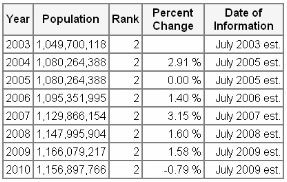
Table 1: – Life expectancy, Age groups. Source: Self generated IndexMundi (2010).
Economy of India
India has a highly developed economical environment, as it is the eleventh position in world economy and its economy grew at its fastest rate due to rapid growth of software sector, infrastructure development, industrial revolution, and proper use of its resources.
According to the report of Library of Congress (2006) from 1947 to the late 1970s, central government centralized the economy of India, but this position changed from 1880s, for instance, privatization of government industries and reduced tariffs help the country to experience 7% annual growth rate.
Library of Congress (2006) also addressed that FDI has enlarged to an annual range of $3.0 billion to $5.0 billion, but the annual progress was not reach at expecting level due to local corruption and external bureaucratic problem with China.
However, the currency of India is “Indian Rupee” (INR), where 1 dollar is equals to 40.55 Indian Rupee, all currencies are in notes and coins, which issued and controlled by the Reserve Bank of India.
Despite huge development of this country, the Indian currency has depreciated gradually against the dollar since the 1971; for example, in 1993, the average exchange rate was only Rs31.290 for $1 while this rate was Rs46.590 in 2003.
Indian Exports
According to the view of Dewett (2005), exporting indicates the promotion and direct sells of locally manufactured products in the foreign market and it is a well-developed and conventional form of strategy to acquiring foreign markets.
Therefore, export is the core basis of revenue for the India’s financial system since it generates large amount of money from this sectors, such as, India’s exports totalled $165 billion in 2009 and about $200.9 billion in 2008 (IndexMundi, 2010).
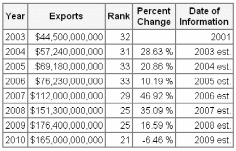
According to the Library of Congress (2004), major exports items are textile products, finished gems and jewellery, electronics items, iron, steel, chemicals, vehicles, petroleum products, oil, fruits and vegetables, beverages and tobacco, precious stones, machinery, leather, leather goods and so on.
Imports to India
India has to import very few items such as raw materials for manufacturing and its main imported commodities are–
- crude oil, precious stones,
- fertilizer,
- Specific chemicals
- Machinery equipment and transport equipment;
- mineral fuels, lubricants and related materials;
- Foods as well as Beverages
- Other luxury products (Library of Congress, 2004);
Table 2: – Total imports to India (Year by Year). Source: – Self generated from IndexMundi (2010).
India and its GDP
IndexMundi (2010) stated that the economic situation of the country is much more favourable for business than any other countries of the globe because India’s GDP for 2007, 2008, & 2009 were $3.113 trillion, $3.344 trillion, and $3.561 trillion gradually.
As GDP demonstrates the main economic strength of the country, it is essential to compare the recent data with previous years and after comparing the data, it can say that the GDPO in India has fall but it is still stable position and the following figure shows it more perfectly –
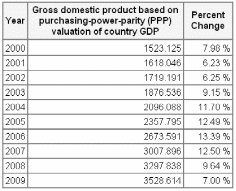
Foreign Direct Investment in India
IndexMundi (2009) mentioned that the foreign direct investment in India measured as $161.3 billion at the end of 2009, which was $123.4 billion in 2007.
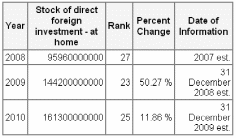
On the other hand, India Company’s investment in abroad where they have significant percentage of equity is treated Direct Investment Abroad (DIA) of India.
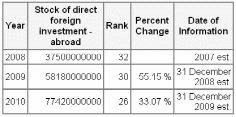
Political System
Kohli (2001) pointed out that after a two centuries British colonial rule India became independent in 1947 and established a multi party federal democratic system based on secularism and social justice. India the world’s biggest democratic country has evidenced successful balance of power between the central and state government with rich diversity of nations.
The major political parties are Congress- that carried out independence, BJP and Left Alliances though there are dozens of regional parties in every state with strong institutional infrastructure. With high religion diversity such as Hindu, Muslim, Buddha, and Christen, Indian political system has ensured human right, freedom of speech, liberty of media, and nourishing scholars to face the challenger of globalisation.
Legal and Regulatory Environment
India is a budding market and so it endorses Foreign Direct Investments in the nation; therefore, the legal system for firms in India is very flexible and the government tries to afford the highest possible business-friendly environment to new-entrants too. However, it is arguable that commercial legislations regarding labour and environmental concerns are indeed very strong.
As per NASSCOM Newsline (2006), India lacks specific laws on privacy and data protection and due to the emergence of IT businesses in the economy, the government is trying to fortify the existing legislations regarding data protection issues including the Indian IT Act, the Indian Contract Act, the Indian Penal Code, and the Indian Copyright Act.
Socio-Cultural Environment
Many people argues that the impact of socio cultural factors are embracing every perspectives of Indian economy, starting from entrepreneurial behaviour, workforce management, consumer attitudes, to overall corporate environment.
The consumer attitudes and their buying behaviour, for example, are widely influenced by their religious backgrounds; according recent studies, the Indian consumers show marked increases in demand for many consumer-goods during periods of religious festivals (like Durga-Puja, Diwali, Eid, Christmas, etc). The following table shows the percentage of the population in to context to religious backgrounds:
Table 4: Religious Background of the Population. Source: Self-generated from neoncarrot (2009).
Numerous generations and cultures in the workplace have caused alterations in motivations and values affecting personal-preferences; India is a place where managing workforce diversity effectively is the most challenging work to do; on the other hand, according to NASSCOM Newsline (2007), there have been significant improvements and changes in values in India in allowing and appreciating women in workplace.
Availability of Resources
Natural resources: India’s total cultivable area is 1,269,219 km², and it has a total water surface area of 314,40 km² are the main natural resource for the country; in addition, Coal, Iron, steel, oil and natural gas also key natural resources; however, the following figure shows that earning from oil exports –
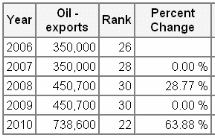
Human resources: The human resource of India is one of the key factors of why the country is showing marked trends in economic development. The country has over years emphasized in edifying and training the HR that has resulted in the creation of highly skilled workforces specialising in different sectors of the economy.
Concern of Ethics and Social Responsibility
The multinational companies operating in India are very much concerned about the imposition of corporate social responsibilities within their organisations in order to ensure that the Indian communities, environment, labours, and other stakeholders does not have any adverse affects by their regular operations.
Many large Indian businesses strictly follows their own corporate regulations regarding ethical concern, but, however, as India is still a developing country, the issue of social responsibility is still quite new to the local businesses and many other new-entrants in the market does not comply to the ethical issues at all.
Visser (2007) argued that the issue of corporate responsibility is still quite immature in developing countries like India and the large companies operating there more often relates CSR with doing charities and spending on education, health, and games; making an economic contribution is often seen as an effective way for a company to built social reputation.
Conclusion
As an emerging economy that always promotes, appreciates, and affords the best possible business environment in order to develop the economic conditions, India is indeed an ideal marketplace where any kind of business can have a good prospect.
Additionally, the rural areas of the country with its conventional observations have developed over time and it is now growing at two-times quicker rate than urban cities, contributing to 60% of the overall national demand that makes these markets as an attractive place for businesses too. These enhancements of the Indian economy would continue to rise in near future turning it into one of the most promising nations throughout the world.
Recommendation
- India rapidly developed their human resources, as a result it would be a perfect place for business;
- Excluding corruption and some legal barriers, Indian government is cooperative to help foreign investors;
- India is the ideal place for trade because of geographic location, business environment and less burden imposed by the government and all legal established products can easily enter in the market of India;
- The labour cost is comparatively lower than other countries, so India is a potential place for business;
- The rural areas of India are currently contributing more than the urban areas in the economy and the labours in those regions are specially trained for the manufacturing industry. Most importantly, the wage costs in those areas are far lower than the central cities, so setting up the business over there will undoubtedly be more profitable than any other places.
Reference List
Dewett, K. K. (2005) Modern Economic Theory. 22nd ed. New Delhi: S. Chand & Company Ltd.
Hamsapriya. (2010) Culture And Business Environment In India. [pdf] Web.
IndexMundi (2010) Exports, Import& GDP of India. Web.
IndexMundi (2010) India Age structure. Web.
IndexMundi (2010) Population of India. Web.
Kohli, A. (2001) Success of India’s Democracy. 1st ed. UK: Cambridge University Press.
Library of Congress (2004) Country Profile: India. Web.
NASSCOM Newsline (2006) Regulatory Environment in India. Web.
NASSCOM Newsline (2007) Workforce. Web.
NCAER (2010) Annual Report 2009-10, The National Council of Applied Economic Research (NCAER). Web.
Neoncarrot (2009) All India Quick Ref stats. [Online] Web.
Prabhudesai, A. (2010) India Economic Survey 2009 – Analysis and Full Report. Web.
Visser, W. (2007) Corporate Social Responsibility in Developing Countries. Web.